Qantas Airlines Marketing Analysis and Strategy Report
VerifiedAdded on 2023/06/04
|13
|4003
|310
Report
AI Summary
This report conducts a comprehensive marketing analysis of Qantas Airlines, a major player in the Australian airline industry. It begins with an introduction to marketing and its application within the organization. The report examines Qantas's company profile, including its history, services, vision, and market orientation. It then applies the 5Cs framework (Company, Customers, Collaborators, Competitors, and Context) to evaluate both internal and external factors affecting Qantas's performance. The analysis delves into the airline's strengths, weaknesses, opportunities, and threats, as well as customer segmentation, key collaborators, and competitive landscape. Furthermore, the report explores the political, economic, social, and technological contexts influencing Qantas. It also discusses market research and market intelligence techniques used by Qantas to gather data for decision-making, including the use of questionnaires, surveys, and online sources. The report concludes by examining Qantas's marketing strategies, particularly its target market selection and positioning, which focuses on business and leisure travelers, and the development of marketing mix strategies. The report provides recommendations to attract more customers and increase its customer base.
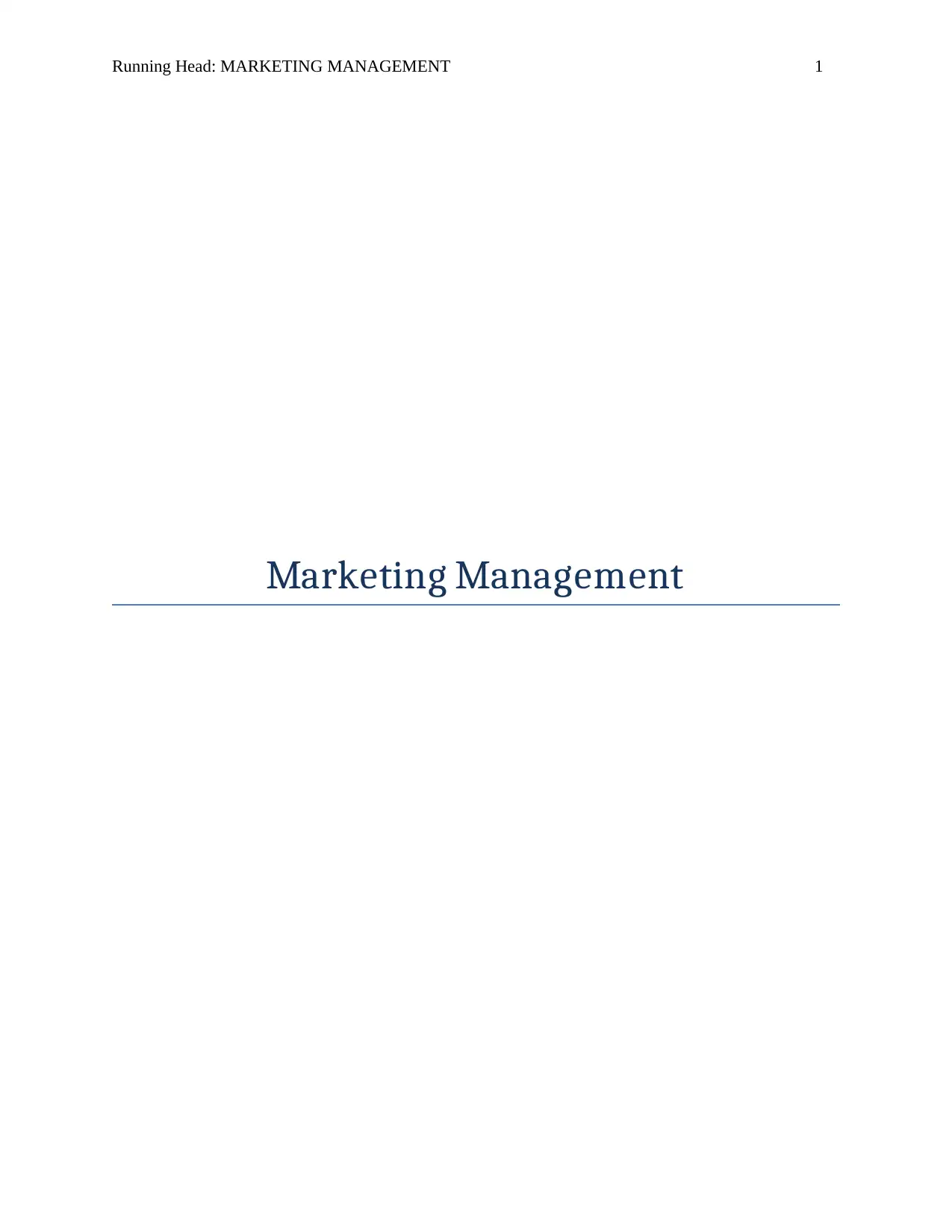
Running Head: MARKETING MANAGEMENT 1
Marketing Management
Marketing Management
Secure Best Marks with AI Grader
Need help grading? Try our AI Grader for instant feedback on your assignments.
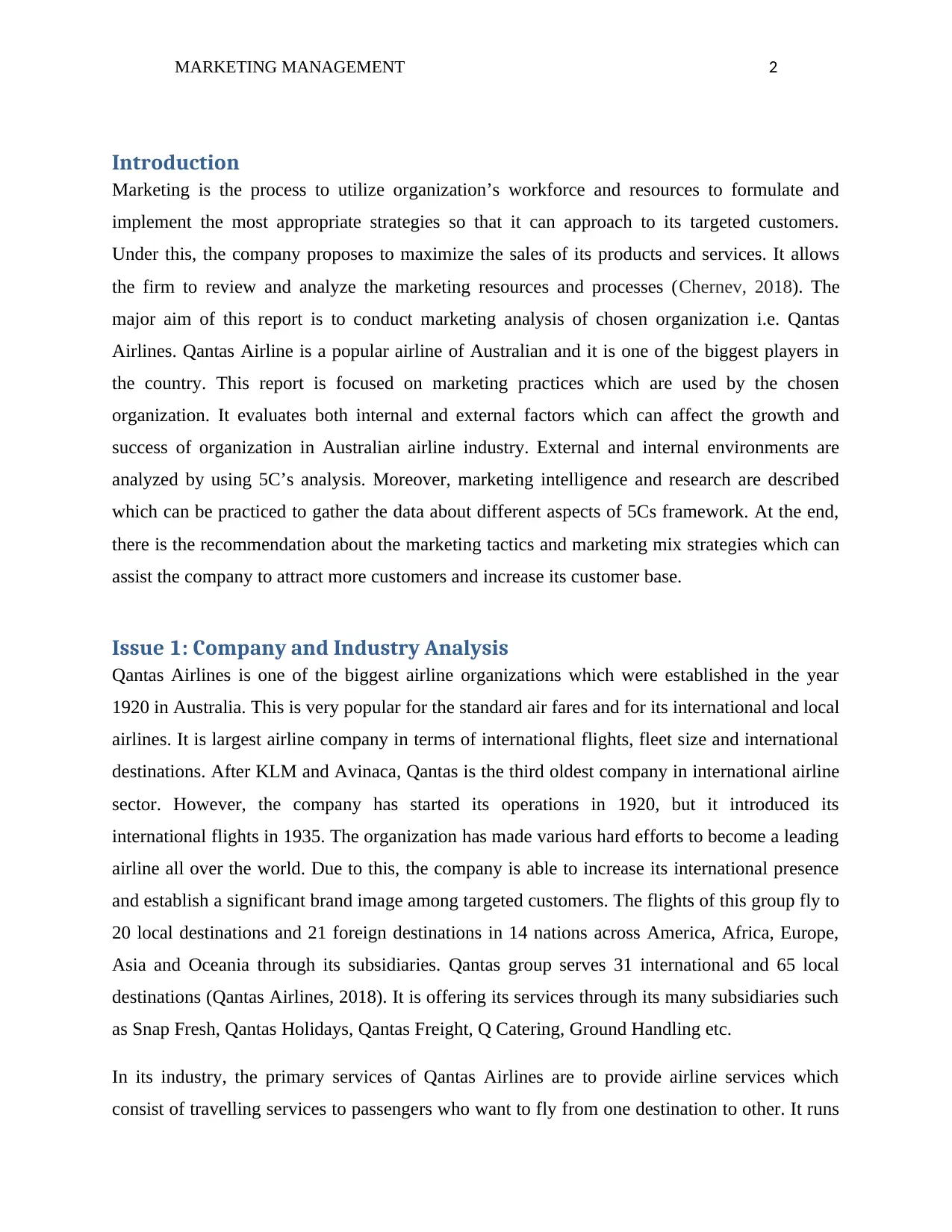
MARKETING MANAGEMENT 2
Introduction
Marketing is the process to utilize organization’s workforce and resources to formulate and
implement the most appropriate strategies so that it can approach to its targeted customers.
Under this, the company proposes to maximize the sales of its products and services. It allows
the firm to review and analyze the marketing resources and processes (Chernev, 2018). The
major aim of this report is to conduct marketing analysis of chosen organization i.e. Qantas
Airlines. Qantas Airline is a popular airline of Australian and it is one of the biggest players in
the country. This report is focused on marketing practices which are used by the chosen
organization. It evaluates both internal and external factors which can affect the growth and
success of organization in Australian airline industry. External and internal environments are
analyzed by using 5C’s analysis. Moreover, marketing intelligence and research are described
which can be practiced to gather the data about different aspects of 5Cs framework. At the end,
there is the recommendation about the marketing tactics and marketing mix strategies which can
assist the company to attract more customers and increase its customer base.
Issue 1: Company and Industry Analysis
Qantas Airlines is one of the biggest airline organizations which were established in the year
1920 in Australia. This is very popular for the standard air fares and for its international and local
airlines. It is largest airline company in terms of international flights, fleet size and international
destinations. After KLM and Avinaca, Qantas is the third oldest company in international airline
sector. However, the company has started its operations in 1920, but it introduced its
international flights in 1935. The organization has made various hard efforts to become a leading
airline all over the world. Due to this, the company is able to increase its international presence
and establish a significant brand image among targeted customers. The flights of this group fly to
20 local destinations and 21 foreign destinations in 14 nations across America, Africa, Europe,
Asia and Oceania through its subsidiaries. Qantas group serves 31 international and 65 local
destinations (Qantas Airlines, 2018). It is offering its services through its many subsidiaries such
as Snap Fresh, Qantas Holidays, Qantas Freight, Q Catering, Ground Handling etc.
In its industry, the primary services of Qantas Airlines are to provide airline services which
consist of travelling services to passengers who want to fly from one destination to other. It runs
Introduction
Marketing is the process to utilize organization’s workforce and resources to formulate and
implement the most appropriate strategies so that it can approach to its targeted customers.
Under this, the company proposes to maximize the sales of its products and services. It allows
the firm to review and analyze the marketing resources and processes (Chernev, 2018). The
major aim of this report is to conduct marketing analysis of chosen organization i.e. Qantas
Airlines. Qantas Airline is a popular airline of Australian and it is one of the biggest players in
the country. This report is focused on marketing practices which are used by the chosen
organization. It evaluates both internal and external factors which can affect the growth and
success of organization in Australian airline industry. External and internal environments are
analyzed by using 5C’s analysis. Moreover, marketing intelligence and research are described
which can be practiced to gather the data about different aspects of 5Cs framework. At the end,
there is the recommendation about the marketing tactics and marketing mix strategies which can
assist the company to attract more customers and increase its customer base.
Issue 1: Company and Industry Analysis
Qantas Airlines is one of the biggest airline organizations which were established in the year
1920 in Australia. This is very popular for the standard air fares and for its international and local
airlines. It is largest airline company in terms of international flights, fleet size and international
destinations. After KLM and Avinaca, Qantas is the third oldest company in international airline
sector. However, the company has started its operations in 1920, but it introduced its
international flights in 1935. The organization has made various hard efforts to become a leading
airline all over the world. Due to this, the company is able to increase its international presence
and establish a significant brand image among targeted customers. The flights of this group fly to
20 local destinations and 21 foreign destinations in 14 nations across America, Africa, Europe,
Asia and Oceania through its subsidiaries. Qantas group serves 31 international and 65 local
destinations (Qantas Airlines, 2018). It is offering its services through its many subsidiaries such
as Snap Fresh, Qantas Holidays, Qantas Freight, Q Catering, Ground Handling etc.
In its industry, the primary services of Qantas Airlines are to provide airline services which
consist of travelling services to passengers who want to fly from one destination to other. It runs
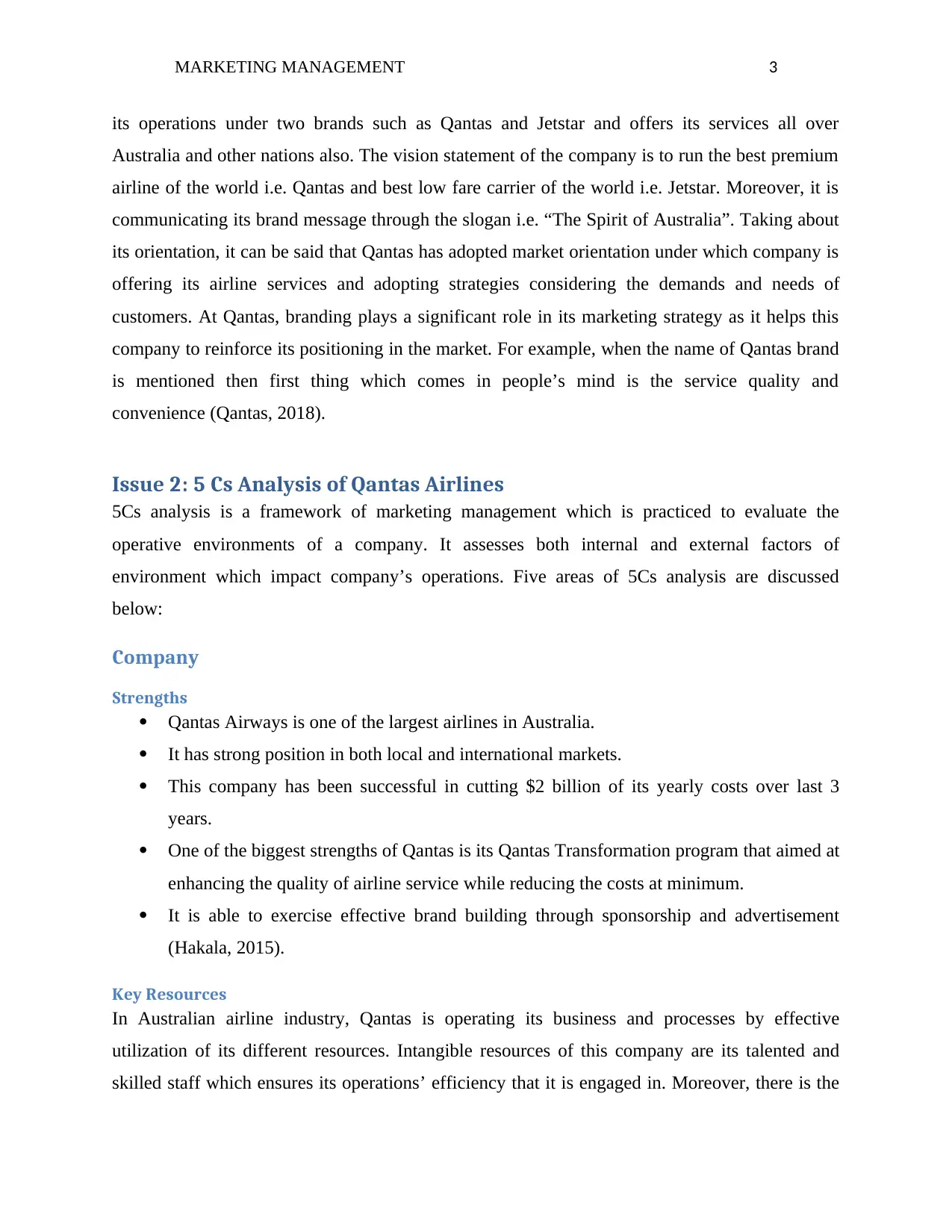
MARKETING MANAGEMENT 3
its operations under two brands such as Qantas and Jetstar and offers its services all over
Australia and other nations also. The vision statement of the company is to run the best premium
airline of the world i.e. Qantas and best low fare carrier of the world i.e. Jetstar. Moreover, it is
communicating its brand message through the slogan i.e. “The Spirit of Australia”. Taking about
its orientation, it can be said that Qantas has adopted market orientation under which company is
offering its airline services and adopting strategies considering the demands and needs of
customers. At Qantas, branding plays a significant role in its marketing strategy as it helps this
company to reinforce its positioning in the market. For example, when the name of Qantas brand
is mentioned then first thing which comes in people’s mind is the service quality and
convenience (Qantas, 2018).
Issue 2: 5 Cs Analysis of Qantas Airlines
5Cs analysis is a framework of marketing management which is practiced to evaluate the
operative environments of a company. It assesses both internal and external factors of
environment which impact company’s operations. Five areas of 5Cs analysis are discussed
below:
Company
Strengths
Qantas Airways is one of the largest airlines in Australia.
It has strong position in both local and international markets.
This company has been successful in cutting $2 billion of its yearly costs over last 3
years.
One of the biggest strengths of Qantas is its Qantas Transformation program that aimed at
enhancing the quality of airline service while reducing the costs at minimum.
It is able to exercise effective brand building through sponsorship and advertisement
(Hakala, 2015).
Key Resources
In Australian airline industry, Qantas is operating its business and processes by effective
utilization of its different resources. Intangible resources of this company are its talented and
skilled staff which ensures its operations’ efficiency that it is engaged in. Moreover, there is the
its operations under two brands such as Qantas and Jetstar and offers its services all over
Australia and other nations also. The vision statement of the company is to run the best premium
airline of the world i.e. Qantas and best low fare carrier of the world i.e. Jetstar. Moreover, it is
communicating its brand message through the slogan i.e. “The Spirit of Australia”. Taking about
its orientation, it can be said that Qantas has adopted market orientation under which company is
offering its airline services and adopting strategies considering the demands and needs of
customers. At Qantas, branding plays a significant role in its marketing strategy as it helps this
company to reinforce its positioning in the market. For example, when the name of Qantas brand
is mentioned then first thing which comes in people’s mind is the service quality and
convenience (Qantas, 2018).
Issue 2: 5 Cs Analysis of Qantas Airlines
5Cs analysis is a framework of marketing management which is practiced to evaluate the
operative environments of a company. It assesses both internal and external factors of
environment which impact company’s operations. Five areas of 5Cs analysis are discussed
below:
Company
Strengths
Qantas Airways is one of the largest airlines in Australia.
It has strong position in both local and international markets.
This company has been successful in cutting $2 billion of its yearly costs over last 3
years.
One of the biggest strengths of Qantas is its Qantas Transformation program that aimed at
enhancing the quality of airline service while reducing the costs at minimum.
It is able to exercise effective brand building through sponsorship and advertisement
(Hakala, 2015).
Key Resources
In Australian airline industry, Qantas is operating its business and processes by effective
utilization of its different resources. Intangible resources of this company are its talented and
skilled staff which ensures its operations’ efficiency that it is engaged in. Moreover, there is the
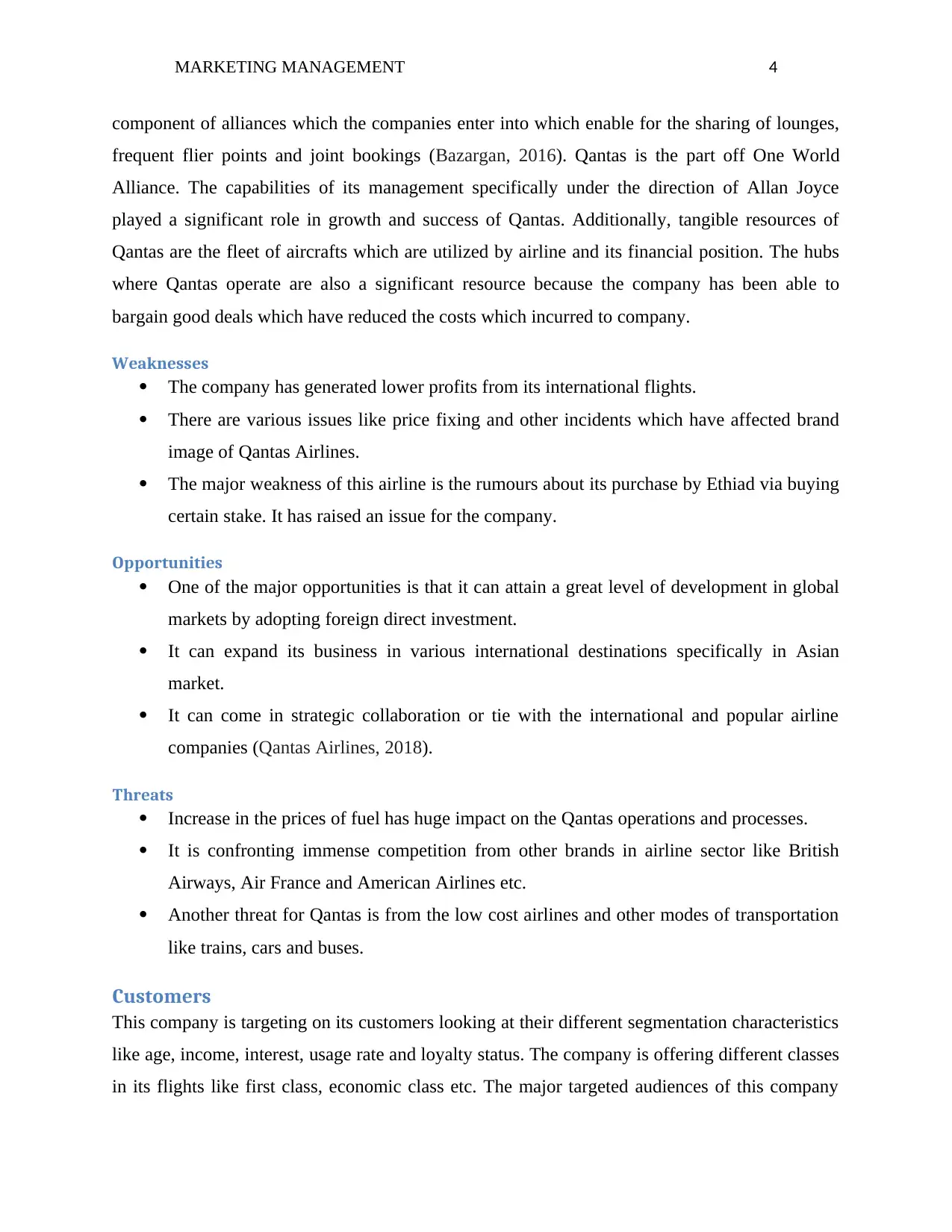
MARKETING MANAGEMENT 4
component of alliances which the companies enter into which enable for the sharing of lounges,
frequent flier points and joint bookings (Bazargan, 2016). Qantas is the part off One World
Alliance. The capabilities of its management specifically under the direction of Allan Joyce
played a significant role in growth and success of Qantas. Additionally, tangible resources of
Qantas are the fleet of aircrafts which are utilized by airline and its financial position. The hubs
where Qantas operate are also a significant resource because the company has been able to
bargain good deals which have reduced the costs which incurred to company.
Weaknesses
The company has generated lower profits from its international flights.
There are various issues like price fixing and other incidents which have affected brand
image of Qantas Airlines.
The major weakness of this airline is the rumours about its purchase by Ethiad via buying
certain stake. It has raised an issue for the company.
Opportunities
One of the major opportunities is that it can attain a great level of development in global
markets by adopting foreign direct investment.
It can expand its business in various international destinations specifically in Asian
market.
It can come in strategic collaboration or tie with the international and popular airline
companies (Qantas Airlines, 2018).
Threats
Increase in the prices of fuel has huge impact on the Qantas operations and processes.
It is confronting immense competition from other brands in airline sector like British
Airways, Air France and American Airlines etc.
Another threat for Qantas is from the low cost airlines and other modes of transportation
like trains, cars and buses.
Customers
This company is targeting on its customers looking at their different segmentation characteristics
like age, income, interest, usage rate and loyalty status. The company is offering different classes
in its flights like first class, economic class etc. The major targeted audiences of this company
component of alliances which the companies enter into which enable for the sharing of lounges,
frequent flier points and joint bookings (Bazargan, 2016). Qantas is the part off One World
Alliance. The capabilities of its management specifically under the direction of Allan Joyce
played a significant role in growth and success of Qantas. Additionally, tangible resources of
Qantas are the fleet of aircrafts which are utilized by airline and its financial position. The hubs
where Qantas operate are also a significant resource because the company has been able to
bargain good deals which have reduced the costs which incurred to company.
Weaknesses
The company has generated lower profits from its international flights.
There are various issues like price fixing and other incidents which have affected brand
image of Qantas Airlines.
The major weakness of this airline is the rumours about its purchase by Ethiad via buying
certain stake. It has raised an issue for the company.
Opportunities
One of the major opportunities is that it can attain a great level of development in global
markets by adopting foreign direct investment.
It can expand its business in various international destinations specifically in Asian
market.
It can come in strategic collaboration or tie with the international and popular airline
companies (Qantas Airlines, 2018).
Threats
Increase in the prices of fuel has huge impact on the Qantas operations and processes.
It is confronting immense competition from other brands in airline sector like British
Airways, Air France and American Airlines etc.
Another threat for Qantas is from the low cost airlines and other modes of transportation
like trains, cars and buses.
Customers
This company is targeting on its customers looking at their different segmentation characteristics
like age, income, interest, usage rate and loyalty status. The company is offering different classes
in its flights like first class, economic class etc. The major targeted audiences of this company
Secure Best Marks with AI Grader
Need help grading? Try our AI Grader for instant feedback on your assignments.
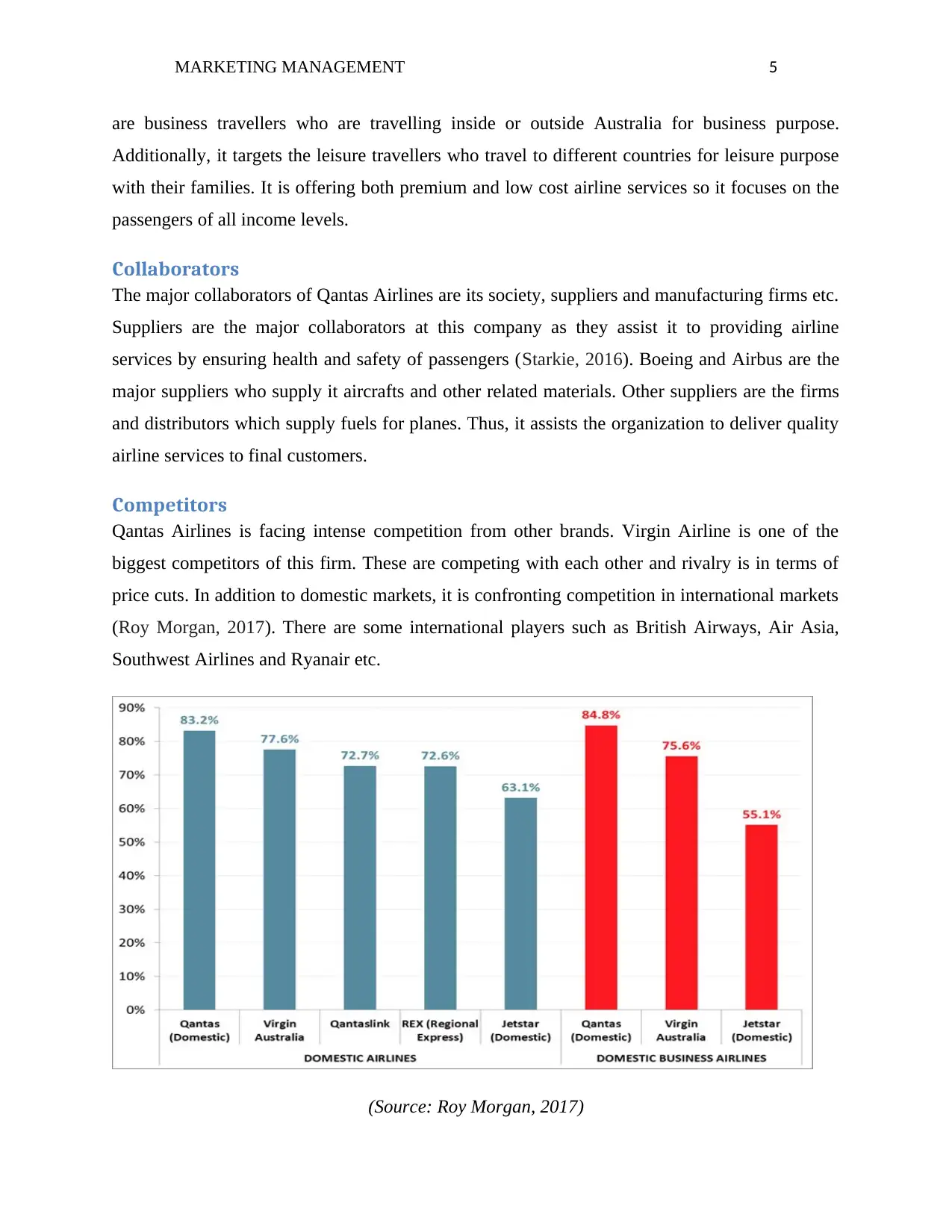
MARKETING MANAGEMENT 5
are business travellers who are travelling inside or outside Australia for business purpose.
Additionally, it targets the leisure travellers who travel to different countries for leisure purpose
with their families. It is offering both premium and low cost airline services so it focuses on the
passengers of all income levels.
Collaborators
The major collaborators of Qantas Airlines are its society, suppliers and manufacturing firms etc.
Suppliers are the major collaborators at this company as they assist it to providing airline
services by ensuring health and safety of passengers (Starkie, 2016). Boeing and Airbus are the
major suppliers who supply it aircrafts and other related materials. Other suppliers are the firms
and distributors which supply fuels for planes. Thus, it assists the organization to deliver quality
airline services to final customers.
Competitors
Qantas Airlines is facing intense competition from other brands. Virgin Airline is one of the
biggest competitors of this firm. These are competing with each other and rivalry is in terms of
price cuts. In addition to domestic markets, it is confronting competition in international markets
(Roy Morgan, 2017). There are some international players such as British Airways, Air Asia,
Southwest Airlines and Ryanair etc.
(Source: Roy Morgan, 2017)
are business travellers who are travelling inside or outside Australia for business purpose.
Additionally, it targets the leisure travellers who travel to different countries for leisure purpose
with their families. It is offering both premium and low cost airline services so it focuses on the
passengers of all income levels.
Collaborators
The major collaborators of Qantas Airlines are its society, suppliers and manufacturing firms etc.
Suppliers are the major collaborators at this company as they assist it to providing airline
services by ensuring health and safety of passengers (Starkie, 2016). Boeing and Airbus are the
major suppliers who supply it aircrafts and other related materials. Other suppliers are the firms
and distributors which supply fuels for planes. Thus, it assists the organization to deliver quality
airline services to final customers.
Competitors
Qantas Airlines is facing intense competition from other brands. Virgin Airline is one of the
biggest competitors of this firm. These are competing with each other and rivalry is in terms of
price cuts. In addition to domestic markets, it is confronting competition in international markets
(Roy Morgan, 2017). There are some international players such as British Airways, Air Asia,
Southwest Airlines and Ryanair etc.
(Source: Roy Morgan, 2017)
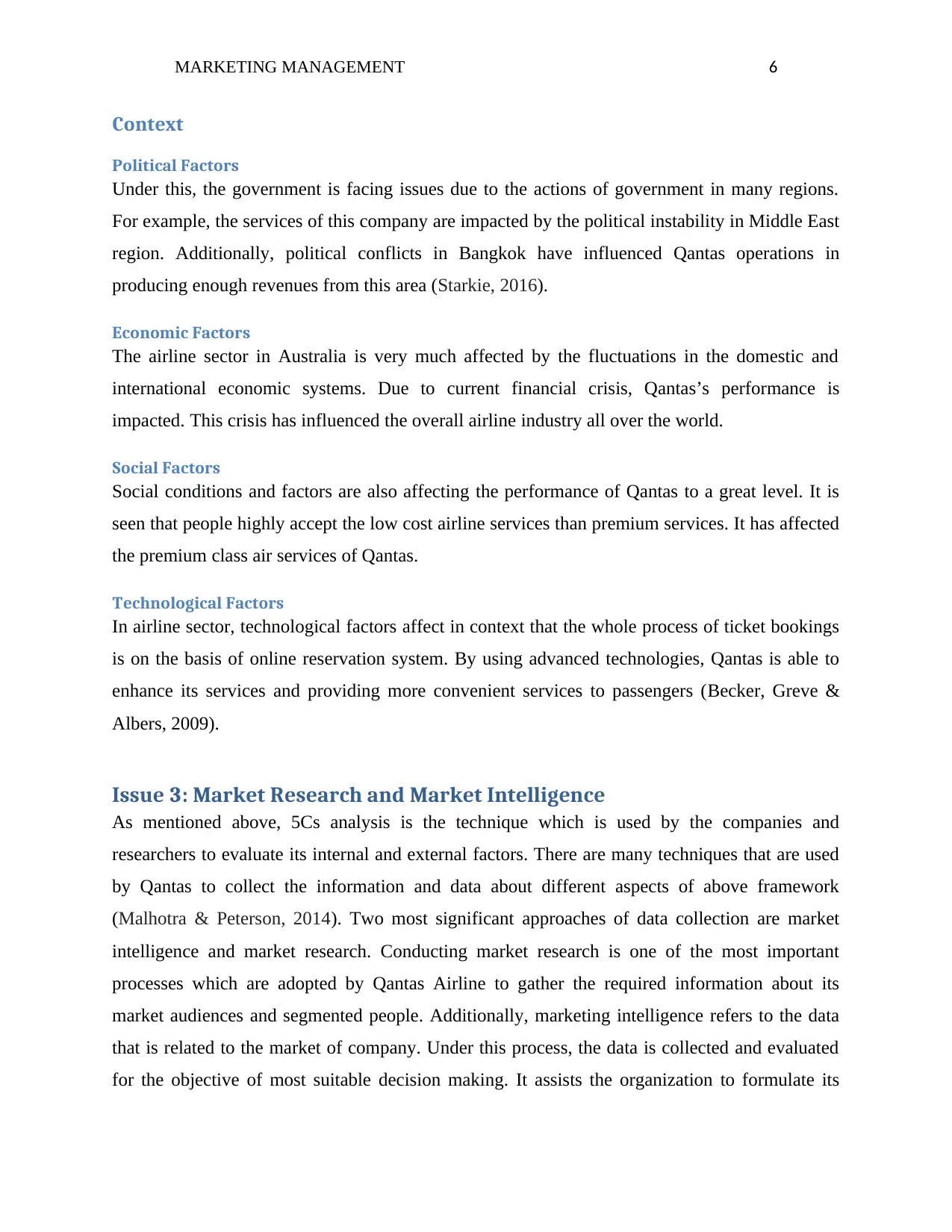
MARKETING MANAGEMENT 6
Context
Political Factors
Under this, the government is facing issues due to the actions of government in many regions.
For example, the services of this company are impacted by the political instability in Middle East
region. Additionally, political conflicts in Bangkok have influenced Qantas operations in
producing enough revenues from this area (Starkie, 2016).
Economic Factors
The airline sector in Australia is very much affected by the fluctuations in the domestic and
international economic systems. Due to current financial crisis, Qantas’s performance is
impacted. This crisis has influenced the overall airline industry all over the world.
Social Factors
Social conditions and factors are also affecting the performance of Qantas to a great level. It is
seen that people highly accept the low cost airline services than premium services. It has affected
the premium class air services of Qantas.
Technological Factors
In airline sector, technological factors affect in context that the whole process of ticket bookings
is on the basis of online reservation system. By using advanced technologies, Qantas is able to
enhance its services and providing more convenient services to passengers (Becker, Greve &
Albers, 2009).
Issue 3: Market Research and Market Intelligence
As mentioned above, 5Cs analysis is the technique which is used by the companies and
researchers to evaluate its internal and external factors. There are many techniques that are used
by Qantas to collect the information and data about different aspects of above framework
(Malhotra & Peterson, 2014). Two most significant approaches of data collection are market
intelligence and market research. Conducting market research is one of the most important
processes which are adopted by Qantas Airline to gather the required information about its
market audiences and segmented people. Additionally, marketing intelligence refers to the data
that is related to the market of company. Under this process, the data is collected and evaluated
for the objective of most suitable decision making. It assists the organization to formulate its
Context
Political Factors
Under this, the government is facing issues due to the actions of government in many regions.
For example, the services of this company are impacted by the political instability in Middle East
region. Additionally, political conflicts in Bangkok have influenced Qantas operations in
producing enough revenues from this area (Starkie, 2016).
Economic Factors
The airline sector in Australia is very much affected by the fluctuations in the domestic and
international economic systems. Due to current financial crisis, Qantas’s performance is
impacted. This crisis has influenced the overall airline industry all over the world.
Social Factors
Social conditions and factors are also affecting the performance of Qantas to a great level. It is
seen that people highly accept the low cost airline services than premium services. It has affected
the premium class air services of Qantas.
Technological Factors
In airline sector, technological factors affect in context that the whole process of ticket bookings
is on the basis of online reservation system. By using advanced technologies, Qantas is able to
enhance its services and providing more convenient services to passengers (Becker, Greve &
Albers, 2009).
Issue 3: Market Research and Market Intelligence
As mentioned above, 5Cs analysis is the technique which is used by the companies and
researchers to evaluate its internal and external factors. There are many techniques that are used
by Qantas to collect the information and data about different aspects of above framework
(Malhotra & Peterson, 2014). Two most significant approaches of data collection are market
intelligence and market research. Conducting market research is one of the most important
processes which are adopted by Qantas Airline to gather the required information about its
market audiences and segmented people. Additionally, marketing intelligence refers to the data
that is related to the market of company. Under this process, the data is collected and evaluated
for the objective of most suitable decision making. It assists the organization to formulate its
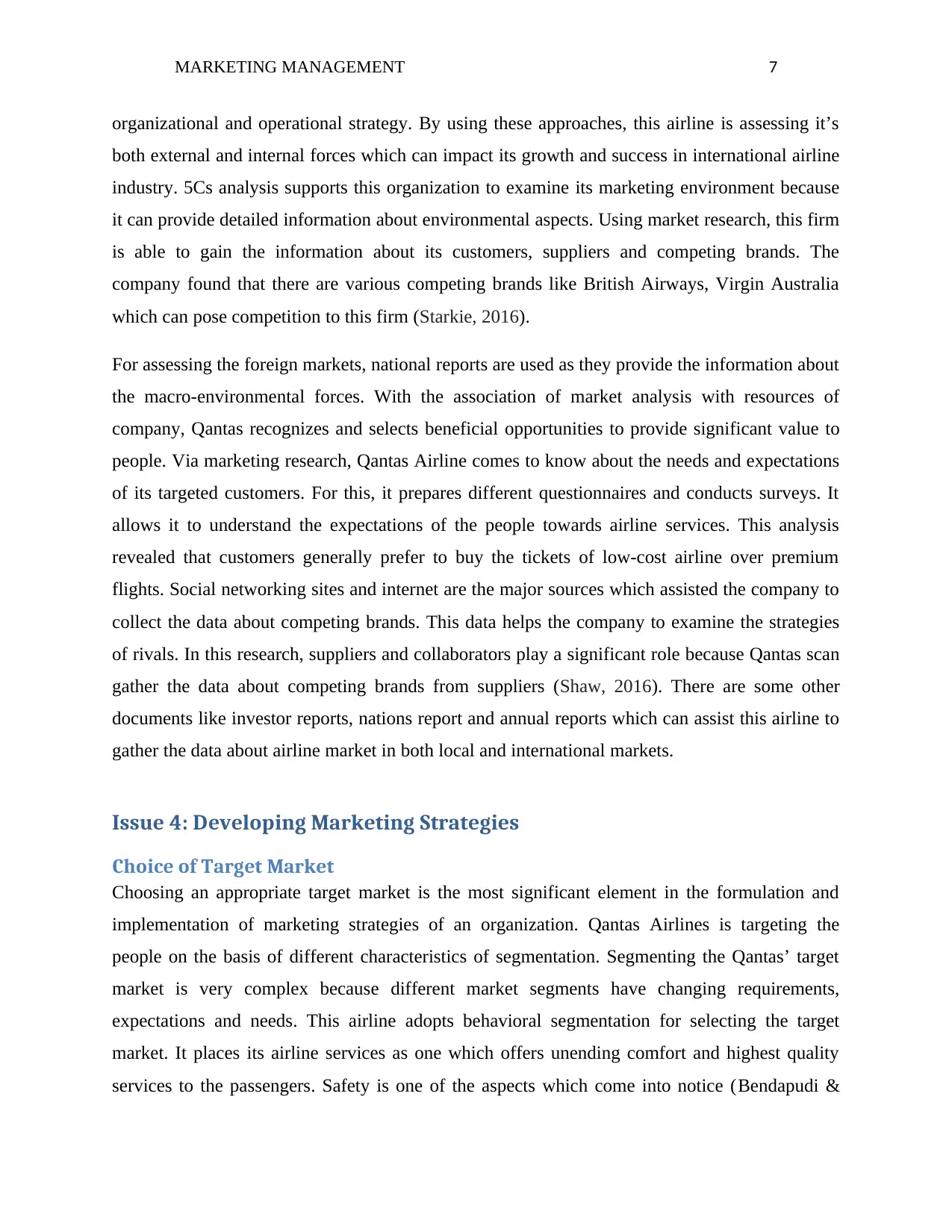
MARKETING MANAGEMENT 7
organizational and operational strategy. By using these approaches, this airline is assessing it’s
both external and internal forces which can impact its growth and success in international airline
industry. 5Cs analysis supports this organization to examine its marketing environment because
it can provide detailed information about environmental aspects. Using market research, this firm
is able to gain the information about its customers, suppliers and competing brands. The
company found that there are various competing brands like British Airways, Virgin Australia
which can pose competition to this firm (Starkie, 2016).
For assessing the foreign markets, national reports are used as they provide the information about
the macro-environmental forces. With the association of market analysis with resources of
company, Qantas recognizes and selects beneficial opportunities to provide significant value to
people. Via marketing research, Qantas Airline comes to know about the needs and expectations
of its targeted customers. For this, it prepares different questionnaires and conducts surveys. It
allows it to understand the expectations of the people towards airline services. This analysis
revealed that customers generally prefer to buy the tickets of low-cost airline over premium
flights. Social networking sites and internet are the major sources which assisted the company to
collect the data about competing brands. This data helps the company to examine the strategies
of rivals. In this research, suppliers and collaborators play a significant role because Qantas scan
gather the data about competing brands from suppliers (Shaw, 2016). There are some other
documents like investor reports, nations report and annual reports which can assist this airline to
gather the data about airline market in both local and international markets.
Issue 4: Developing Marketing Strategies
Choice of Target Market
Choosing an appropriate target market is the most significant element in the formulation and
implementation of marketing strategies of an organization. Qantas Airlines is targeting the
people on the basis of different characteristics of segmentation. Segmenting the Qantas’ target
market is very complex because different market segments have changing requirements,
expectations and needs. This airline adopts behavioral segmentation for selecting the target
market. It places its airline services as one which offers unending comfort and highest quality
services to the passengers. Safety is one of the aspects which come into notice (Bendapudi &
organizational and operational strategy. By using these approaches, this airline is assessing it’s
both external and internal forces which can impact its growth and success in international airline
industry. 5Cs analysis supports this organization to examine its marketing environment because
it can provide detailed information about environmental aspects. Using market research, this firm
is able to gain the information about its customers, suppliers and competing brands. The
company found that there are various competing brands like British Airways, Virgin Australia
which can pose competition to this firm (Starkie, 2016).
For assessing the foreign markets, national reports are used as they provide the information about
the macro-environmental forces. With the association of market analysis with resources of
company, Qantas recognizes and selects beneficial opportunities to provide significant value to
people. Via marketing research, Qantas Airline comes to know about the needs and expectations
of its targeted customers. For this, it prepares different questionnaires and conducts surveys. It
allows it to understand the expectations of the people towards airline services. This analysis
revealed that customers generally prefer to buy the tickets of low-cost airline over premium
flights. Social networking sites and internet are the major sources which assisted the company to
collect the data about competing brands. This data helps the company to examine the strategies
of rivals. In this research, suppliers and collaborators play a significant role because Qantas scan
gather the data about competing brands from suppliers (Shaw, 2016). There are some other
documents like investor reports, nations report and annual reports which can assist this airline to
gather the data about airline market in both local and international markets.
Issue 4: Developing Marketing Strategies
Choice of Target Market
Choosing an appropriate target market is the most significant element in the formulation and
implementation of marketing strategies of an organization. Qantas Airlines is targeting the
people on the basis of different characteristics of segmentation. Segmenting the Qantas’ target
market is very complex because different market segments have changing requirements,
expectations and needs. This airline adopts behavioral segmentation for selecting the target
market. It places its airline services as one which offers unending comfort and highest quality
services to the passengers. Safety is one of the aspects which come into notice (Bendapudi &
Paraphrase This Document
Need a fresh take? Get an instant paraphrase of this document with our AI Paraphraser
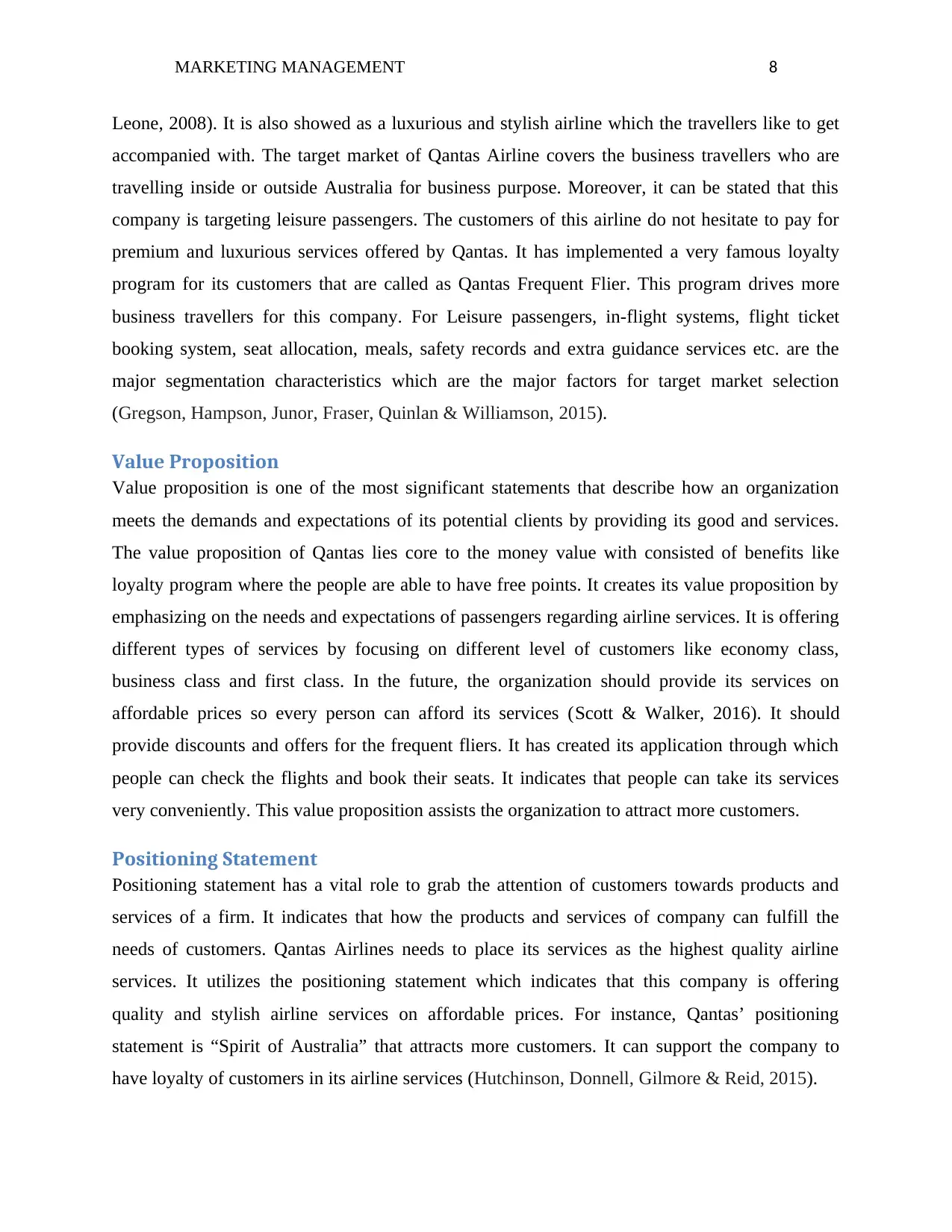
MARKETING MANAGEMENT 8
Leone, 2008). It is also showed as a luxurious and stylish airline which the travellers like to get
accompanied with. The target market of Qantas Airline covers the business travellers who are
travelling inside or outside Australia for business purpose. Moreover, it can be stated that this
company is targeting leisure passengers. The customers of this airline do not hesitate to pay for
premium and luxurious services offered by Qantas. It has implemented a very famous loyalty
program for its customers that are called as Qantas Frequent Flier. This program drives more
business travellers for this company. For Leisure passengers, in-flight systems, flight ticket
booking system, seat allocation, meals, safety records and extra guidance services etc. are the
major segmentation characteristics which are the major factors for target market selection
(Gregson, Hampson, Junor, Fraser, Quinlan & Williamson, 2015).
Value Proposition
Value proposition is one of the most significant statements that describe how an organization
meets the demands and expectations of its potential clients by providing its good and services.
The value proposition of Qantas lies core to the money value with consisted of benefits like
loyalty program where the people are able to have free points. It creates its value proposition by
emphasizing on the needs and expectations of passengers regarding airline services. It is offering
different types of services by focusing on different level of customers like economy class,
business class and first class. In the future, the organization should provide its services on
affordable prices so every person can afford its services (Scott & Walker, 2016). It should
provide discounts and offers for the frequent fliers. It has created its application through which
people can check the flights and book their seats. It indicates that people can take its services
very conveniently. This value proposition assists the organization to attract more customers.
Positioning Statement
Positioning statement has a vital role to grab the attention of customers towards products and
services of a firm. It indicates that how the products and services of company can fulfill the
needs of customers. Qantas Airlines needs to place its services as the highest quality airline
services. It utilizes the positioning statement which indicates that this company is offering
quality and stylish airline services on affordable prices. For instance, Qantas’ positioning
statement is “Spirit of Australia” that attracts more customers. It can support the company to
have loyalty of customers in its airline services (Hutchinson, Donnell, Gilmore & Reid, 2015).
Leone, 2008). It is also showed as a luxurious and stylish airline which the travellers like to get
accompanied with. The target market of Qantas Airline covers the business travellers who are
travelling inside or outside Australia for business purpose. Moreover, it can be stated that this
company is targeting leisure passengers. The customers of this airline do not hesitate to pay for
premium and luxurious services offered by Qantas. It has implemented a very famous loyalty
program for its customers that are called as Qantas Frequent Flier. This program drives more
business travellers for this company. For Leisure passengers, in-flight systems, flight ticket
booking system, seat allocation, meals, safety records and extra guidance services etc. are the
major segmentation characteristics which are the major factors for target market selection
(Gregson, Hampson, Junor, Fraser, Quinlan & Williamson, 2015).
Value Proposition
Value proposition is one of the most significant statements that describe how an organization
meets the demands and expectations of its potential clients by providing its good and services.
The value proposition of Qantas lies core to the money value with consisted of benefits like
loyalty program where the people are able to have free points. It creates its value proposition by
emphasizing on the needs and expectations of passengers regarding airline services. It is offering
different types of services by focusing on different level of customers like economy class,
business class and first class. In the future, the organization should provide its services on
affordable prices so every person can afford its services (Scott & Walker, 2016). It should
provide discounts and offers for the frequent fliers. It has created its application through which
people can check the flights and book their seats. It indicates that people can take its services
very conveniently. This value proposition assists the organization to attract more customers.
Positioning Statement
Positioning statement has a vital role to grab the attention of customers towards products and
services of a firm. It indicates that how the products and services of company can fulfill the
needs of customers. Qantas Airlines needs to place its services as the highest quality airline
services. It utilizes the positioning statement which indicates that this company is offering
quality and stylish airline services on affordable prices. For instance, Qantas’ positioning
statement is “Spirit of Australia” that attracts more customers. It can support the company to
have loyalty of customers in its airline services (Hutchinson, Donnell, Gilmore & Reid, 2015).
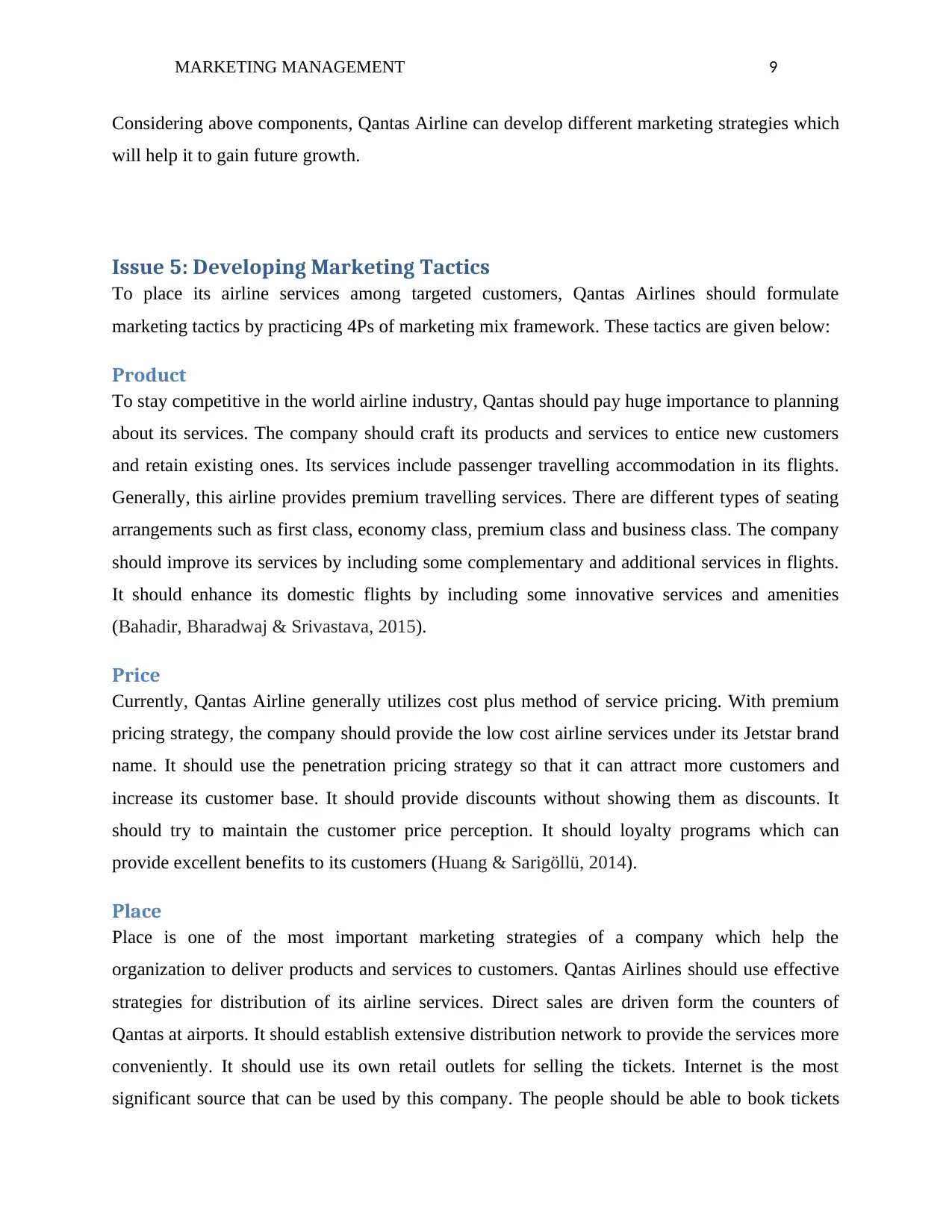
MARKETING MANAGEMENT 9
Considering above components, Qantas Airline can develop different marketing strategies which
will help it to gain future growth.
Issue 5: Developing Marketing Tactics
To place its airline services among targeted customers, Qantas Airlines should formulate
marketing tactics by practicing 4Ps of marketing mix framework. These tactics are given below:
Product
To stay competitive in the world airline industry, Qantas should pay huge importance to planning
about its services. The company should craft its products and services to entice new customers
and retain existing ones. Its services include passenger travelling accommodation in its flights.
Generally, this airline provides premium travelling services. There are different types of seating
arrangements such as first class, economy class, premium class and business class. The company
should improve its services by including some complementary and additional services in flights.
It should enhance its domestic flights by including some innovative services and amenities
(Bahadir, Bharadwaj & Srivastava, 2015).
Price
Currently, Qantas Airline generally utilizes cost plus method of service pricing. With premium
pricing strategy, the company should provide the low cost airline services under its Jetstar brand
name. It should use the penetration pricing strategy so that it can attract more customers and
increase its customer base. It should provide discounts without showing them as discounts. It
should try to maintain the customer price perception. It should loyalty programs which can
provide excellent benefits to its customers (Huang & Sarigöllü, 2014).
Place
Place is one of the most important marketing strategies of a company which help the
organization to deliver products and services to customers. Qantas Airlines should use effective
strategies for distribution of its airline services. Direct sales are driven form the counters of
Qantas at airports. It should establish extensive distribution network to provide the services more
conveniently. It should use its own retail outlets for selling the tickets. Internet is the most
significant source that can be used by this company. The people should be able to book tickets
Considering above components, Qantas Airline can develop different marketing strategies which
will help it to gain future growth.
Issue 5: Developing Marketing Tactics
To place its airline services among targeted customers, Qantas Airlines should formulate
marketing tactics by practicing 4Ps of marketing mix framework. These tactics are given below:
Product
To stay competitive in the world airline industry, Qantas should pay huge importance to planning
about its services. The company should craft its products and services to entice new customers
and retain existing ones. Its services include passenger travelling accommodation in its flights.
Generally, this airline provides premium travelling services. There are different types of seating
arrangements such as first class, economy class, premium class and business class. The company
should improve its services by including some complementary and additional services in flights.
It should enhance its domestic flights by including some innovative services and amenities
(Bahadir, Bharadwaj & Srivastava, 2015).
Price
Currently, Qantas Airline generally utilizes cost plus method of service pricing. With premium
pricing strategy, the company should provide the low cost airline services under its Jetstar brand
name. It should use the penetration pricing strategy so that it can attract more customers and
increase its customer base. It should provide discounts without showing them as discounts. It
should try to maintain the customer price perception. It should loyalty programs which can
provide excellent benefits to its customers (Huang & Sarigöllü, 2014).
Place
Place is one of the most important marketing strategies of a company which help the
organization to deliver products and services to customers. Qantas Airlines should use effective
strategies for distribution of its airline services. Direct sales are driven form the counters of
Qantas at airports. It should establish extensive distribution network to provide the services more
conveniently. It should use its own retail outlets for selling the tickets. Internet is the most
significant source that can be used by this company. The people should be able to book tickets
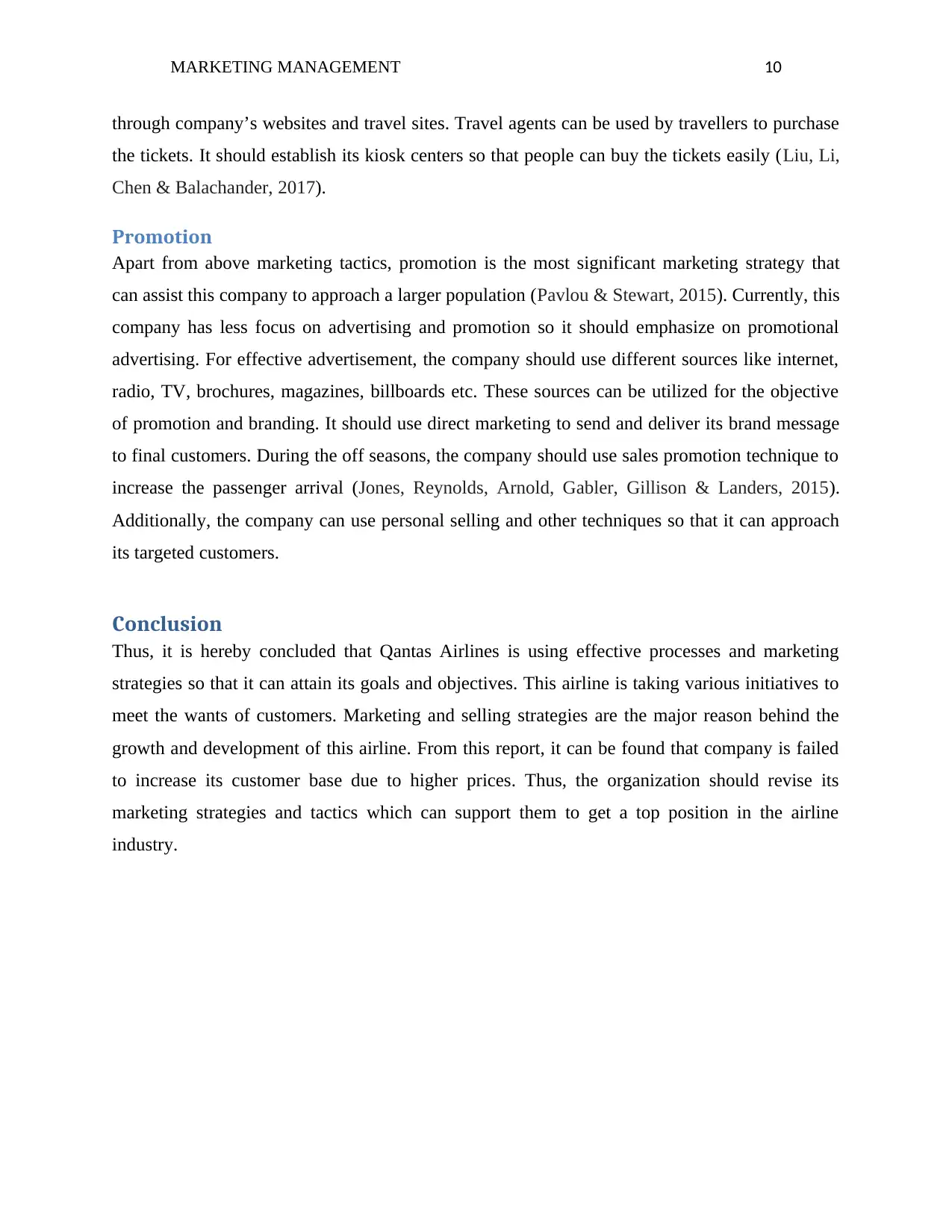
MARKETING MANAGEMENT 10
through company’s websites and travel sites. Travel agents can be used by travellers to purchase
the tickets. It should establish its kiosk centers so that people can buy the tickets easily (Liu, Li,
Chen & Balachander, 2017).
Promotion
Apart from above marketing tactics, promotion is the most significant marketing strategy that
can assist this company to approach a larger population (Pavlou & Stewart, 2015). Currently, this
company has less focus on advertising and promotion so it should emphasize on promotional
advertising. For effective advertisement, the company should use different sources like internet,
radio, TV, brochures, magazines, billboards etc. These sources can be utilized for the objective
of promotion and branding. It should use direct marketing to send and deliver its brand message
to final customers. During the off seasons, the company should use sales promotion technique to
increase the passenger arrival (Jones, Reynolds, Arnold, Gabler, Gillison & Landers, 2015).
Additionally, the company can use personal selling and other techniques so that it can approach
its targeted customers.
Conclusion
Thus, it is hereby concluded that Qantas Airlines is using effective processes and marketing
strategies so that it can attain its goals and objectives. This airline is taking various initiatives to
meet the wants of customers. Marketing and selling strategies are the major reason behind the
growth and development of this airline. From this report, it can be found that company is failed
to increase its customer base due to higher prices. Thus, the organization should revise its
marketing strategies and tactics which can support them to get a top position in the airline
industry.
through company’s websites and travel sites. Travel agents can be used by travellers to purchase
the tickets. It should establish its kiosk centers so that people can buy the tickets easily (Liu, Li,
Chen & Balachander, 2017).
Promotion
Apart from above marketing tactics, promotion is the most significant marketing strategy that
can assist this company to approach a larger population (Pavlou & Stewart, 2015). Currently, this
company has less focus on advertising and promotion so it should emphasize on promotional
advertising. For effective advertisement, the company should use different sources like internet,
radio, TV, brochures, magazines, billboards etc. These sources can be utilized for the objective
of promotion and branding. It should use direct marketing to send and deliver its brand message
to final customers. During the off seasons, the company should use sales promotion technique to
increase the passenger arrival (Jones, Reynolds, Arnold, Gabler, Gillison & Landers, 2015).
Additionally, the company can use personal selling and other techniques so that it can approach
its targeted customers.
Conclusion
Thus, it is hereby concluded that Qantas Airlines is using effective processes and marketing
strategies so that it can attain its goals and objectives. This airline is taking various initiatives to
meet the wants of customers. Marketing and selling strategies are the major reason behind the
growth and development of this airline. From this report, it can be found that company is failed
to increase its customer base due to higher prices. Thus, the organization should revise its
marketing strategies and tactics which can support them to get a top position in the airline
industry.
Secure Best Marks with AI Grader
Need help grading? Try our AI Grader for instant feedback on your assignments.
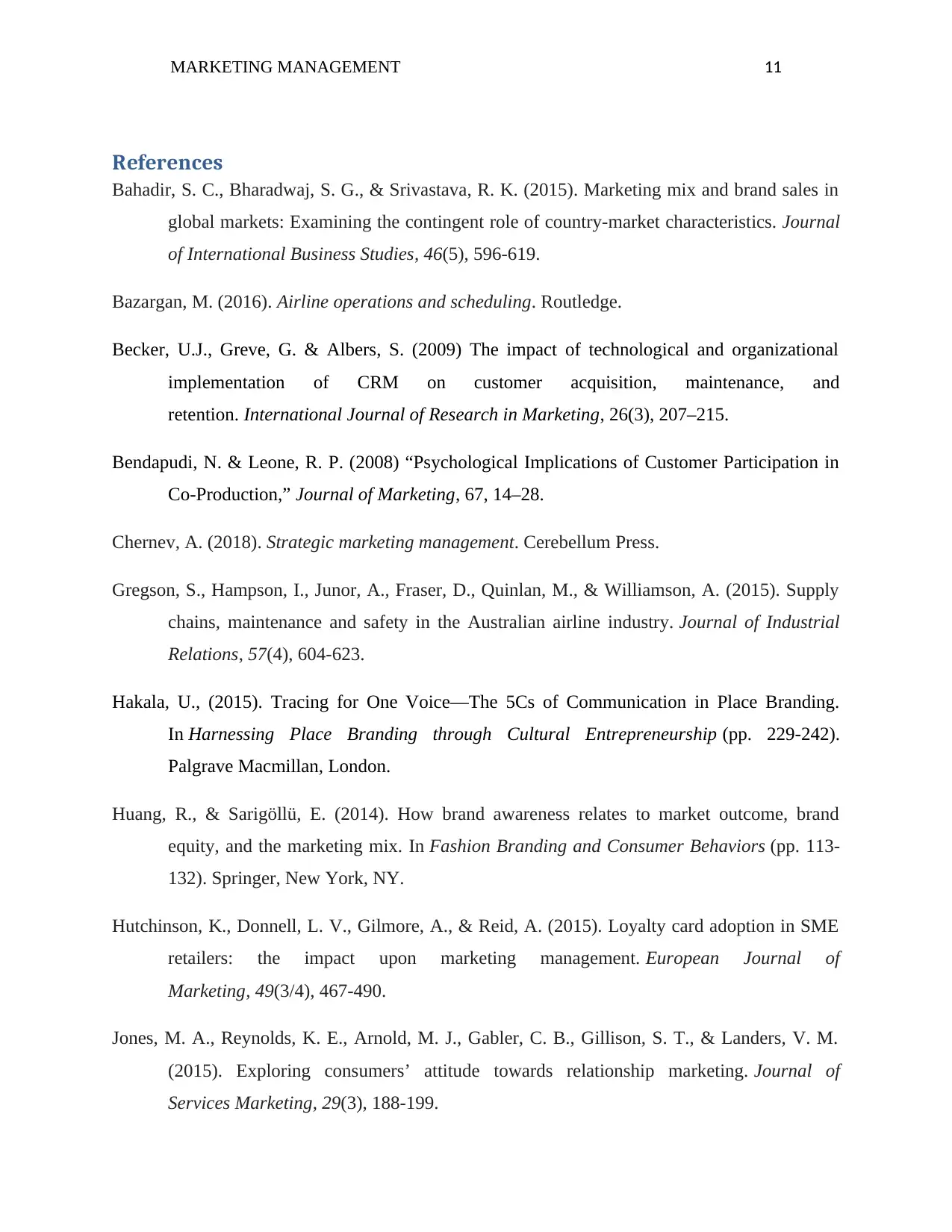
MARKETING MANAGEMENT 11
References
Bahadir, S. C., Bharadwaj, S. G., & Srivastava, R. K. (2015). Marketing mix and brand sales in
global markets: Examining the contingent role of country-market characteristics. Journal
of International Business Studies, 46(5), 596-619.
Bazargan, M. (2016). Airline operations and scheduling. Routledge.
Becker, U.J., Greve, G. & Albers, S. (2009) The impact of technological and organizational
implementation of CRM on customer acquisition, maintenance, and
retention. International Journal of Research in Marketing, 26(3), 207–215.
Bendapudi, N. & Leone, R. P. (2008) “Psychological Implications of Customer Participation in
Co-Production,” Journal of Marketing, 67, 14–28.
Chernev, A. (2018). Strategic marketing management. Cerebellum Press.
Gregson, S., Hampson, I., Junor, A., Fraser, D., Quinlan, M., & Williamson, A. (2015). Supply
chains, maintenance and safety in the Australian airline industry. Journal of Industrial
Relations, 57(4), 604-623.
Hakala, U., (2015). Tracing for One Voice—The 5Cs of Communication in Place Branding.
In Harnessing Place Branding through Cultural Entrepreneurship (pp. 229-242).
Palgrave Macmillan, London.
Huang, R., & Sarigöllü, E. (2014). How brand awareness relates to market outcome, brand
equity, and the marketing mix. In Fashion Branding and Consumer Behaviors (pp. 113-
132). Springer, New York, NY.
Hutchinson, K., Donnell, L. V., Gilmore, A., & Reid, A. (2015). Loyalty card adoption in SME
retailers: the impact upon marketing management. European Journal of
Marketing, 49(3/4), 467-490.
Jones, M. A., Reynolds, K. E., Arnold, M. J., Gabler, C. B., Gillison, S. T., & Landers, V. M.
(2015). Exploring consumers’ attitude towards relationship marketing. Journal of
Services Marketing, 29(3), 188-199.
References
Bahadir, S. C., Bharadwaj, S. G., & Srivastava, R. K. (2015). Marketing mix and brand sales in
global markets: Examining the contingent role of country-market characteristics. Journal
of International Business Studies, 46(5), 596-619.
Bazargan, M. (2016). Airline operations and scheduling. Routledge.
Becker, U.J., Greve, G. & Albers, S. (2009) The impact of technological and organizational
implementation of CRM on customer acquisition, maintenance, and
retention. International Journal of Research in Marketing, 26(3), 207–215.
Bendapudi, N. & Leone, R. P. (2008) “Psychological Implications of Customer Participation in
Co-Production,” Journal of Marketing, 67, 14–28.
Chernev, A. (2018). Strategic marketing management. Cerebellum Press.
Gregson, S., Hampson, I., Junor, A., Fraser, D., Quinlan, M., & Williamson, A. (2015). Supply
chains, maintenance and safety in the Australian airline industry. Journal of Industrial
Relations, 57(4), 604-623.
Hakala, U., (2015). Tracing for One Voice—The 5Cs of Communication in Place Branding.
In Harnessing Place Branding through Cultural Entrepreneurship (pp. 229-242).
Palgrave Macmillan, London.
Huang, R., & Sarigöllü, E. (2014). How brand awareness relates to market outcome, brand
equity, and the marketing mix. In Fashion Branding and Consumer Behaviors (pp. 113-
132). Springer, New York, NY.
Hutchinson, K., Donnell, L. V., Gilmore, A., & Reid, A. (2015). Loyalty card adoption in SME
retailers: the impact upon marketing management. European Journal of
Marketing, 49(3/4), 467-490.
Jones, M. A., Reynolds, K. E., Arnold, M. J., Gabler, C. B., Gillison, S. T., & Landers, V. M.
(2015). Exploring consumers’ attitude towards relationship marketing. Journal of
Services Marketing, 29(3), 188-199.
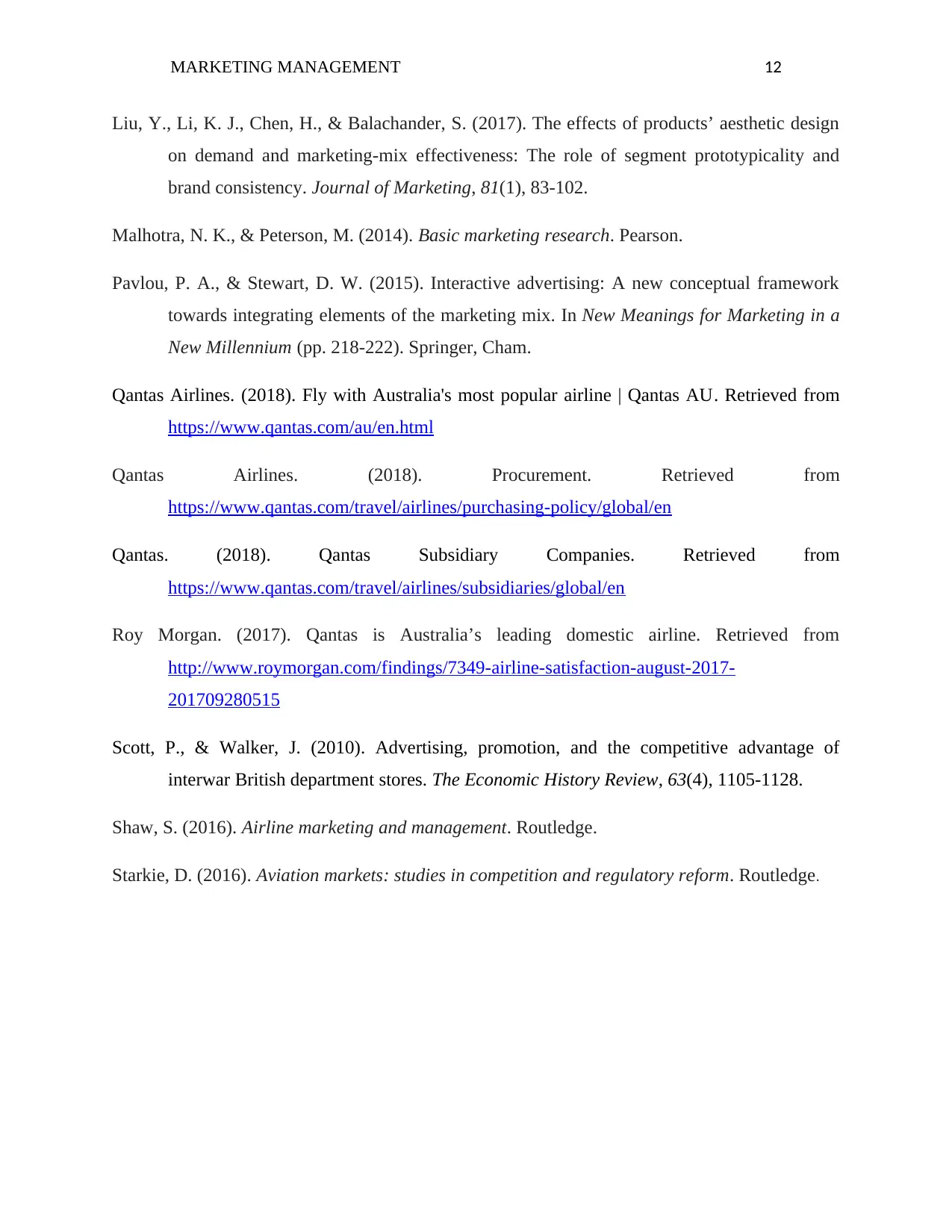
MARKETING MANAGEMENT 12
Liu, Y., Li, K. J., Chen, H., & Balachander, S. (2017). The effects of products’ aesthetic design
on demand and marketing-mix effectiveness: The role of segment prototypicality and
brand consistency. Journal of Marketing, 81(1), 83-102.
Malhotra, N. K., & Peterson, M. (2014). Basic marketing research. Pearson.
Pavlou, P. A., & Stewart, D. W. (2015). Interactive advertising: A new conceptual framework
towards integrating elements of the marketing mix. In New Meanings for Marketing in a
New Millennium (pp. 218-222). Springer, Cham.
Qantas Airlines. (2018). Fly with Australia's most popular airline | Qantas AU. Retrieved from
https://www.qantas.com/au/en.html
Qantas Airlines. (2018). Procurement. Retrieved from
https://www.qantas.com/travel/airlines/purchasing-policy/global/en
Qantas. (2018). Qantas Subsidiary Companies. Retrieved from
https://www.qantas.com/travel/airlines/subsidiaries/global/en
Roy Morgan. (2017). Qantas is Australia’s leading domestic airline. Retrieved from
http://www.roymorgan.com/findings/7349-airline-satisfaction-august-2017-
201709280515
Scott, P., & Walker, J. (2010). Advertising, promotion, and the competitive advantage of
interwar British department stores. The Economic History Review, 63(4), 1105-1128.
Shaw, S. (2016). Airline marketing and management. Routledge.
Starkie, D. (2016). Aviation markets: studies in competition and regulatory reform. Routledge.
Liu, Y., Li, K. J., Chen, H., & Balachander, S. (2017). The effects of products’ aesthetic design
on demand and marketing-mix effectiveness: The role of segment prototypicality and
brand consistency. Journal of Marketing, 81(1), 83-102.
Malhotra, N. K., & Peterson, M. (2014). Basic marketing research. Pearson.
Pavlou, P. A., & Stewart, D. W. (2015). Interactive advertising: A new conceptual framework
towards integrating elements of the marketing mix. In New Meanings for Marketing in a
New Millennium (pp. 218-222). Springer, Cham.
Qantas Airlines. (2018). Fly with Australia's most popular airline | Qantas AU. Retrieved from
https://www.qantas.com/au/en.html
Qantas Airlines. (2018). Procurement. Retrieved from
https://www.qantas.com/travel/airlines/purchasing-policy/global/en
Qantas. (2018). Qantas Subsidiary Companies. Retrieved from
https://www.qantas.com/travel/airlines/subsidiaries/global/en
Roy Morgan. (2017). Qantas is Australia’s leading domestic airline. Retrieved from
http://www.roymorgan.com/findings/7349-airline-satisfaction-august-2017-
201709280515
Scott, P., & Walker, J. (2010). Advertising, promotion, and the competitive advantage of
interwar British department stores. The Economic History Review, 63(4), 1105-1128.
Shaw, S. (2016). Airline marketing and management. Routledge.
Starkie, D. (2016). Aviation markets: studies in competition and regulatory reform. Routledge.
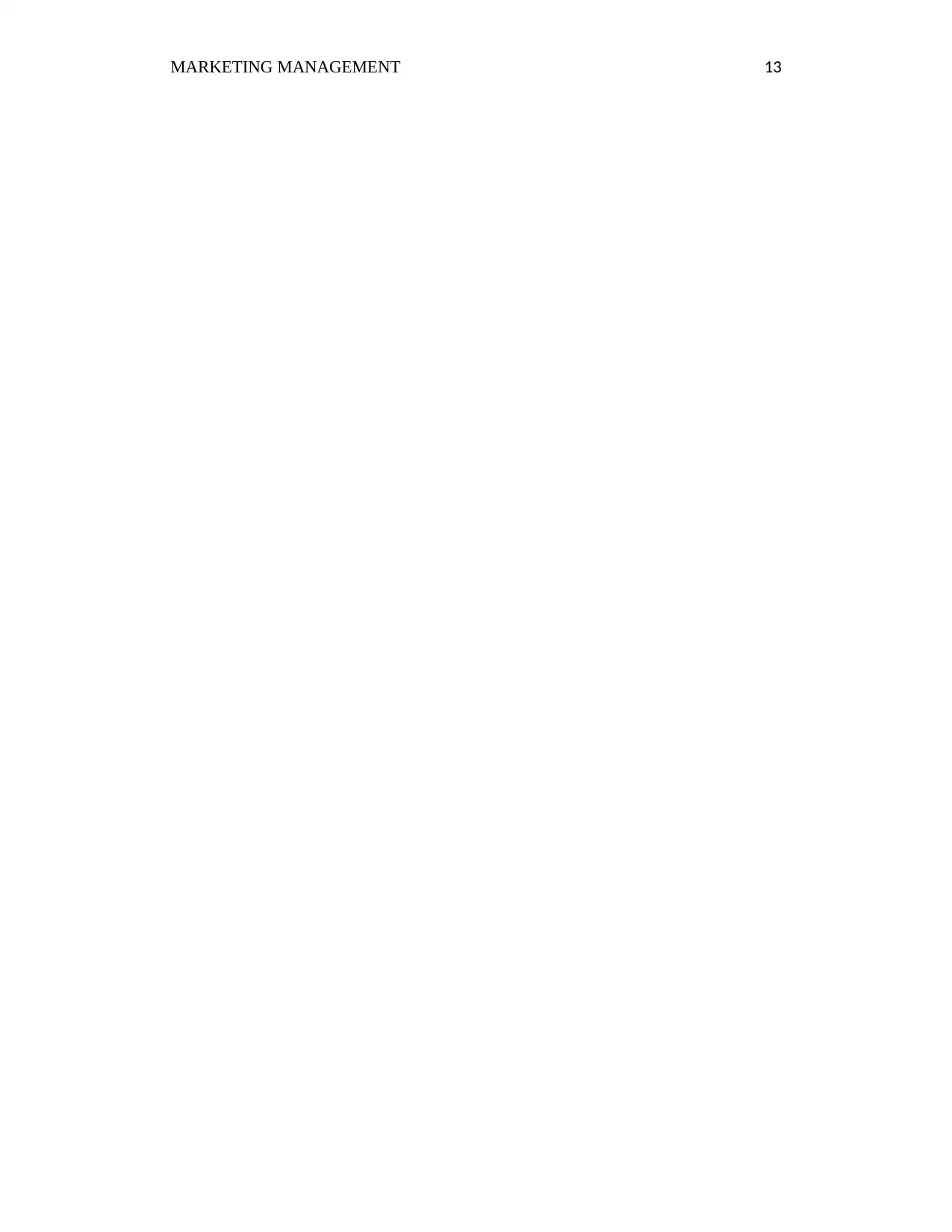
MARKETING MANAGEMENT 13
1 out of 13
Related Documents
Your All-in-One AI-Powered Toolkit for Academic Success.
+13062052269
info@desklib.com
Available 24*7 on WhatsApp / Email
![[object Object]](/_next/static/media/star-bottom.7253800d.svg)
Unlock your academic potential
© 2024 | Zucol Services PVT LTD | All rights reserved.





